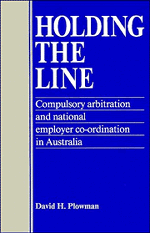Book contents
- Frontmatter
- Contents
- List of tables and figures
- List of abbreviations
- Acknowledgements
- Introduction
- Dedication
- 1 Industrial legislation and the rise of permanent employer associations 1890–1906
- 2 The Higgins era 1907–1920
- 3 Rival shops 1921–1929
- 4 Depression and recovery 1930–1939
- 5 War and government executive action 1940–1949
- 6 Consolidation 1950–1959
- 7 The National Employers' Associations 1960–1972
- 8 Confederation 1973–1988
- 9 Models of national employer co-ordination
- Appendices
- Bibliography
- Records of organisations
- Index
7 - The National Employers' Associations 1960–1972
Published online by Cambridge University Press: 05 November 2011
- Frontmatter
- Contents
- List of tables and figures
- List of abbreviations
- Acknowledgements
- Introduction
- Dedication
- 1 Industrial legislation and the rise of permanent employer associations 1890–1906
- 2 The Higgins era 1907–1920
- 3 Rival shops 1921–1929
- 4 Depression and recovery 1930–1939
- 5 War and government executive action 1940–1949
- 6 Consolidation 1950–1959
- 7 The National Employers' Associations 1960–1972
- 8 Confederation 1973–1988
- 9 Models of national employer co-ordination
- Appendices
- Bibliography
- Records of organisations
- Index
Summary
The previous chapter reviewed developments in the 1950s. Though the ACEF had still not been able to persuade other organisations of the need for a Confederation of Employers, developments during that decade provided a firm basis for the introduction of better and more permanent machinery for co-ordinating employers' national test case submissions. By the end of the decade both the Policy and Consultative Committee and the Basic Wage Working Party had been constituted as standing bodies. By then, too, the ACEF had provided for the appointment of an Executive Director capable of overseeing its national industrial service, while the ACMA had established an industrial service.
Developments on the national wage front, and in particular the major wage gains won by unions at the Basic Wage and Metal Trades Margins cases of 1959, forced the Policy and Consultative Committee to review its traditional approach of straight-out opposition to union claims. In order to determine policy on a case-by-case basis without a return to the ad hoc approach that had previously prevailed, the National Employers' Associations (NEA) was formed in 1961. This loose-knit organisation met as required and provided the funds for test cases. The conduct of the cases was administered by two NEA Committees, a Policy Committee and an Industrial Committee. These Committees resembled, in most respects, the Policy and Consultative Committee and the Basic Wage Working Party.
- Type
- Chapter
- Information
- Holding the LineCompulsory Arbitration and National Employer Co-ordination in Australia, pp. 150 - 171Publisher: Cambridge University PressPrint publication year: 1989



